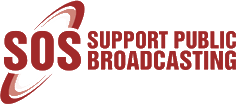
SOS reiterates its call that the SABC Board must publish a full report of investigations conducted into Mpho Tsedu’s allegations of editorial interference.
September 12, 2023The SABC Bill — a massive blow to public broadcasting as we know it
November 8, 2023SOS and MMA: The New SABC Bill Is a Disaster That Will Take Public Broadcasting Backwards

The new SABC Bill approved by Cabinet on 27 September 2023 presents extreme threats to editorial and institutional independence of the SABC, media freedom and the very existence of public broadcasting in South Africa. SOS Support Public Broadcasting Coalition and Media Monitoring Africa (MMA) unequivocally reject the Bill and call for its immediate withdrawal.
SOS and MMA are at a loss to understand how Cabinet could have passed such a flawed and premature Bill. We submit that the Bill is in no state to be tabled in Parliament. Not only do the provisions undermine key principles of public broadcasting but there were serious irregularities with the process itself.
While the Bill is supposed to improve the functioning of the SABC as a multi- channel, multi-platform content services provider on linear and non- linear basis, making it better suited to fulfil its mandate – it seems to do the opposite.
Funding
The Bill singularly fails to address the funding crisis.
It continues to provide for the same old television licence fee model which has been such a failure that not even government departments comply with it. Two months ago, the Minister of Communications and Digital Technologies (DCDT) informed Parliament that the SABC has lost about R44 Billion in unpaid licence fees over the years – undermining its viability.
Worse, the Bill promises that the Minister will “develop a funding model framework to ensure a State based funding mechanism for the SABC” but only in three years’ time.
The bottom line is that the public mandate of the SABC is unfunded. If this continues, the viability of the public broadcaster will be increasingly shaky with impacts felt across the board but particularly in the quality of programming content.
New Commercial Board
The Bill also introduces a subsidiary company to run the commercial operations of the SABC (including SABC 3). This is to a Commercial Board. This raises many questions about the future of the SABC as a public broadcaster. This sudden u-turn is unjustifiable given that in both drafts of the White Paper on Audio and Audio-Visual Media Services and Content Online Safety, the DCDT has clearly stated that the public commercial division has failed, from its inception in 1999, to cross subsidise the public division.
Ministerial Powers
Perhaps the most concerning aspect of the Bill are the powers this Bill confers upon the Minister which are contrary to prominent court judgments that specifically require protection of the independence of the public broadcaster from Ministerial interference. The Bill’s provisions allow the Minister to have a veto over the appointment of an interim Board of the SABC and any extension of a Board’s term after the end of the second term by six months or until a new Board is appointed. These powers are further entrenched in the appointment of a Commercial Board. The Minister has a veto over the appointment of the members of the Commercial Board and the appointment of the Chairperson. .
By making the SABC subject to Ministerial veto, it invites executive and political interference. The Bill exacerbates the concerns of political interference in editorial decisions particularly in the run-up to the 2024 elections, including by the regressive requirement making the CEO and not the Head of News, the Editor in Chief. In short, it makes room for future cadre deployment and government agendas to flourish.
Outdated
While the Bill makes smoke references to audio and audio visual content, the Bill offers no meaningful engagement with the emerging digital reality, where much of the SABC audience still relies on analogue, yet at the same time the SABC must shift to digital offerings. Rather than offering firms clauses on local content and how to bolster and further protect a core mandate of the SABC – news and current affairs – the Bill waters down the SABC commitment from having to adhere to the highest standard to merely high standards of quality ethical journalism. Given the critical role of public broadcaster globally in the fight against mis and disinformation the Bill fails in this area as well.
Procedural Irregularities
The Bill is premature and is clearly being unduly rushed through parliament in a policy vacuum. Monday the 9th of October is the closing date for submissions on the 2nd Draft White Paper which includes a whole section on policy proposals for the SABC in the digital era. Worse, the Bill is at odds with the substantive policy proposals contained in the Draft White Paper. It is flawed, indeed illegal, law-making to introduce a Bill while fundamental national policy on the subject matter of the Bill is being developed but is not yet finalized and where the extent of the proposed Ministerial interference has never been subject to a public notice and comment procedure.
SOS and MMA urge Parliament to refuse to accept the SABC Bill and to insist that it be withdrawn by the DCDT and for it to be resubmitted after substantial amendments have been effected in line with the finalised White Paper and after proper public consultations on its provisions have been completed.
For more information contact:
Uyanda Siyotula
National Coordinator at SOS Support Broadcasting Coalition (SOS)
060 691 2462
William Bird
Director at Media Monitoring Africa (MMA)
082 887 1370
